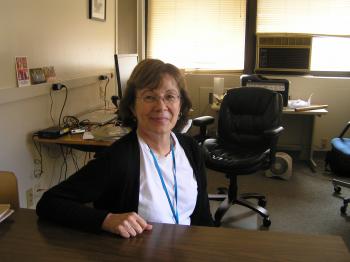Gina Ylitalo

Voices from the Science Centers
Voices from the Science Centers is an oral history initiative dedicated to documenting the institutional knowledge of fisheries scientists and administrators in the labs of NOAA’s Fisheries Science Centers.
Gina Ylitalo is an environmental chemist at the Northwest Fisheries Science Center in Seattle, Washington. She was born in Yakima, Washington in 1957, and has been interested in a career in science since junior high.She attended Yakima Valley Community College for two years before transferring to Western Washington University and receiving a bachelor’s degree in biochemistry. She earned her Master of Science in Chemistry from Western Washington University and was hired by National Marine Fisheries Service in 1989. She is currently the program manager of the environmental chemistry program.
Interview contains discussions of:Northwest Fisheries Science Center, NMFS, NOAA, environmental chemistry, Exxon Valdez oil spill, Deepwater Horizon oil spill, PAHs, PCBs, DDTs, legacy contaminants, xenoestrogens, marine mammals, Gulf War.
In this interview, Gina Ylitalo discusses her work developing analytical methods for detecting environmental contaminants as an environmental chemist with NOAA. She started at the Northwest Fisheries Science Center in April 1989. Since the Exxon Valdez oil spill had happened only a month earlier, it became the major focus of her early work. She went to Alaska on the NOAA R/V Fairweather to help with analyses of fish bile for hazardous compounds associated with oil spills. After that, Ylitalo worked to develop methods for analyzing and detecting different classes of environmental contaminants. She explains that even though legacy contaminants like PCBs and DDTs have been banned, they still exist in the environment and accumulate in animals at the top of the food chain. She also describes how advancements in computing technology have revolutionized how chemists can collect, identify, and analyze data, and allow them to do it more rapidly than in the past. Her lab collaborates extensively with other NMFS science centers and organizations around the country because of the unique chemical analysis work that they do.
The Deepwater Horizon oil spill also had a major impact on her work, and she did seafood safety analyses for a year after the spill. Her lab continues to analyze the contaminate levels in marine mammals and sea turtles even years later, and she feels very proud of the work she has done with the two major oil spills. Another enjoyable time was her month-long research experience doing shipboard analyses of fish in the Persian Gulf after the Gulf War.
Ylitalo has seen an increase in the number of female scientists since she started working at the agency, but believes there still is a lot of progress to be made in terms of diversity. In the future, she predicts that chemical analyses will continue to become faster and more accurate, and that they will begin to look at other chemical tracers besides contaminants to learn about the nutrition of animals. She also believes the technology for obtaining non-lethal samples from difficult to capture animals like whales will become more advanced. Currently, her lab is working on the ability to do a suite of chemical tracers in samples from marine mammals for things like hormones and fatty acids.
Please Note: The oral histories in this collection are protected by copyright and have been created for educational, research and personal use as described by the Fair Use Doctrine in the U.S. Copyright law. Please reach out Voices@noaa.gov to let us know how these interviews are being used in your research, project, exhibit, etc. The Voices staff can help provide other useful resources related to your inquiry.
The NOAA mission is to understand and predict changes in climate, weather, oceans, and coasts, to share that knowledge and information with others, and to conserve and manage coastal and marine ecosystems and resources. The Voices Oral History Archives offers public access to a wide range of accounts, including historical materials that are products of their particular times, and may contain offensive language or negative stereotypes.
Voices Oral History Archives does not verify the accuracy of materials submitted to us. The opinions expressed in the interviews are those of the interviewee only. The interviews here have been made available to the public only after the interviewer has confirmed that they have obtained consent.
